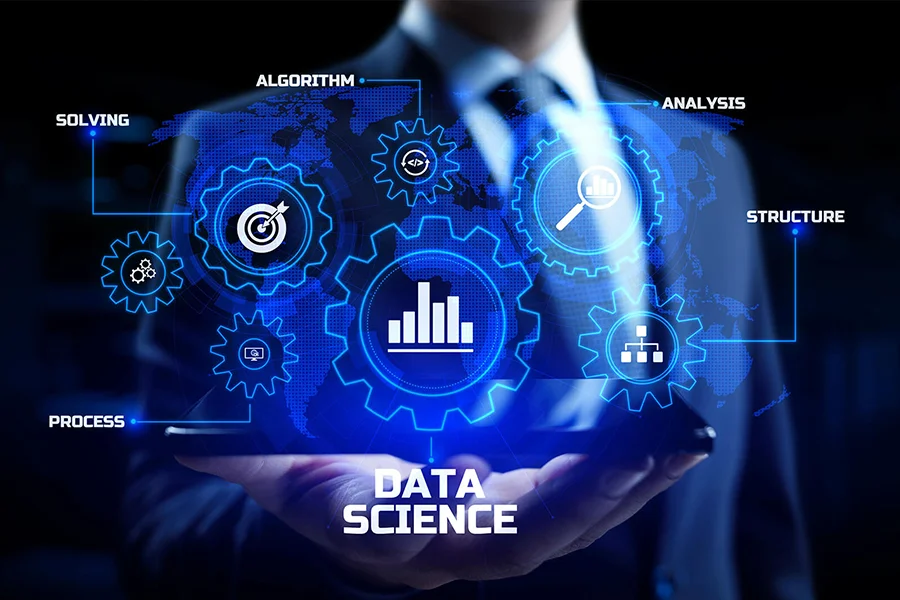Data science has emerged as a pivotal force, transforming various sectors, including education. Leveraging data science techniques and technologies in educational settings has the potential to revolutionize teaching methodologies, personalize learning experiences, and significantly enhance learning outcomes.
Data science’s capacity to analyze enormous volumes of data has created numerous opportunities for better learning outcomes and educational institutions. Personalized educational experiences and improved learning outcomes have been made possible by educators and institutions using data science in recent years.
Let’s understand the role of data science in revolutionizing education and how pursuing a data scientist course can be a gateway to contributing to this transformation.
Understanding Data Science’s Impact on Education

Data science is the application of statistical analysis, machine learning, and predictive modeling approaches to extract meaningful insights from structured and unstructured data.
Within the field of education, this discipline is essential in several ways:
Personalized learning paths
A notable advantage of data science is its ability to create personalized learning journeys. Academic institutions have the capability to tailor teaching methods and course structures to align with the unique requirements of each student. This involves collecting and assessing data related to students’ learning styles, preferences, strengths, and areas that need improvement. This personalized approach fosters a more efficient and enjoyable learning atmosphere, accommodating various learning styles and unlocking the full potential of each student.
Predictive Analytics
Data science enables the implementation of predictive analytics to forecast student performance. By analyzing historical data such as grades, attendance, and participation, educational institutions can identify patterns and predictors of academic success or areas where students might struggle. This proactive approach allows educators to intervene early, providing necessary support and interventions to improve student outcomes and prevent potential challenges.
Enhanced decision-making
Educational administrators and policymakers can leverage data science to make data-driven decisions. By analyzing data related to student demographics, resource allocation, classroom effectiveness, and teaching methodologies, institutions can optimize strategies, allocate resources efficiently, and implement evidence-based policies that positively impact overall educational quality.
Role of Data Scientists in Transformation Education

Data-driven decision making
Institutions harness the expertise of data scientists to decipher complex datasets, enabling informed decision-making. These professionals utilize advanced analytics to extract actionable insights, aiding administrators in devising strategies to improve institutional effectiveness and student outcomes.
Implementing AI-powered learning tools
Data scientists are pivotal in developing AI-powered tools and platforms to facilitate interactive and adaptive learning experiences. These tools, ranging from intelligent tutoring systems to personalized learning applications, cater to diverse learning needs, fostering engagement and knowledge retention.
The growing demand for Data Science Courses in Education
The growing dependence of data science in education has led to an upsurge in the need for courses in this field. These training programs provide a thorough comprehension of data analytics, machine learning, and statistical modeling, designed specifically to meet the unique requirements of the educational sector.
Role of Data Science Courses in Advancing Education
The increasing demand for skilled professionals in data science has led to the development of specialized courses. Enrolling in a data scientist course equips individuals with the necessary skills to analyze educational data effectively.
Bridging the skills gap
As data and data science gets more and more integrated with the education sector, the need for qualified data scientists is growing. Courses for data scientists provide the chance to master statistical modeling, machine learning, and data analysis in-depth. Professionals with these abilities can use data-driven solutions to enhance learning outcomes and drive innovation in education.
Empowering educators with data literacy
Educators themselves benefit from data scientist courses tailored for the education sector. These courses provide them with the necessary skills to interpret and utilize educational data effectively. Empowering teachers with data literacy enables them to leverage insights for personalized instruction, better student engagement, and more effective classroom management.
Fostering innovation in educational technologies
Data scientist courses not only focus on theoretical concepts but also emphasize practical applications within the education landscape. Graduates are equipped to develop innovative educational technologies, such as adaptive learning platforms, intelligent tutoring systems, and learning analytics tools. These advancements facilitate personalized learning experiences and contribute to the overall enhancement of education quality.
The Importance of Data Scientist Courses

Bridging the gap between Education and Technology
Educators can bridge the gap between traditional teaching methodology and technological advances by enrolling in data science courses. They can harness the potential of data science to improve teaching techniques and student outcomes.
Curriculum Tailored for Educational Applications
Data scientist courses focused on education equip individuals with the skills required to analyze educational data effectively. They cover topics such as data visualization, predictive modeling, and educational data mining, providing a specialized skill set applicable to educational settings.
Specialized Skill Development
Comprehensive instruction in machine learning techniques, statistical analysis, programming languages, data visualization, and other areas is offered by data scientist courses. These abilities are critical for analyzing intricate educational data, seeing patterns, and drawing useful conclusions that may be used to enhance teaching and learning methods.
Meeting industry demand
The education sector increasingly values professionals who can leverage data science to enhance learning outcomes. Completing a data scientist course positions individuals at the forefront of this demand, opening doors to diverse career opportunities within educational institutions, ed-tech companies, policy-making bodies, and more.
Impact on Educators and Institutions
Equipping educators with data science skills can revolutionize teaching methodologies. Educators can utilize data analytics tools to track student progress, identify learning gaps, and adapt teaching strategies accordingly.
Application of Data Science Techniques in Education
Individuals undertaking a data scientist course learn to apply data science methodologies directly to educational contexts. This includes working on real-world projects involving educational data, developing predictive models for student performance, optimizing curriculum design, and implementing data-driven solutions to address educational challenges.
Curriculum of a Data Scientist Course

A comprehensive data scientist course typically covers statistical analysis, machine learning, data visualization, and programming languages like Python and R. These skills are directly applicable in the educational sector, empowering professionals to extract actionable insights from educational data.
Conclusion
Data science is revolutionizing the education sector. The data-driven future of learning can be achieved by embracing data scientist courses.
Integrating Data Science into education catalyzes a paradigm shift in learning methodologies, fostering personalized, data-driven approaches. The pivotal role of Data Scientists in interpreting and leveraging educational data underscores the necessity of specialized training through a data scientist course. Embracing this dynamic field not only enhances individual career prospects but also contributes to revolutionizing education, ultimately enriching learning outcomes and shaping a brighter future for generations to come.






![Calgary’s Hottest Neighborhoods for Luxury Homebuyers [2024]](https://thewashingtonote.com/wp-content/uploads/2024/04/Calgary-324x160.png)



